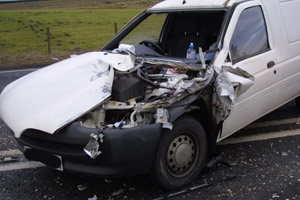 Research funded by the National Institute of Mental Health aims to develop a group therapy programme that can be used by psychologists to treat the thousands of people every year who develop PTSD after traumatic car accidents, according to claims specialist YouClaim.
Research funded by the National Institute of Mental Health aims to develop a group therapy programme that can be used by psychologists to treat the thousands of people every year who develop PTSD after traumatic car accidents, according to claims specialist YouClaim.“Group therapy makes sense for a lot of PTSD patients,” said psychologist Dr Gayle Beck, a director of the Motor Vehicle Accident Clinic in Buffalo, New York.
The disorder often leaves a person feeling isolated and misunderstood, so it’s helpful to be in a room of other people who have the same kinds of feelings. Second, in a group setting patients can be more effective than a therapist in encouraging one another to ‘do their homework’ and take important steps towards improvement.
 Many people who have experienced car accidents feel unable to drive for years afterwards. Depression, anger and anxiety are common symptoms of PTSD, along with avoidance behaviours and general panic disorder. Hyper-arousal and looking out for potential trauma or life-threatening problems is also common and can be linked to anxieties about what has been experienced: a near-fatal accident.
Many people who have experienced car accidents feel unable to drive for years afterwards. Depression, anger and anxiety are common symptoms of PTSD, along with avoidance behaviours and general panic disorder. Hyper-arousal and looking out for potential trauma or life-threatening problems is also common and can be linked to anxieties about what has been experienced: a near-fatal accident.PTSD following a car accident is currently underdiagnosed in the UK, and whiplash receives more attention. Despite this fact, a car accident can result in compound neurological and emotional problems that can affect somebody psychologically and cause extreme difficulties in maintaining a normal life.
Although cognitive behavioural therapy (CBT) is available on the NHS, it can take some time to work through the referral system to get an appointment. Cultural attitudes to accidents, including a ‘just get over it’ dismissal of people’s problems, can have a negative impact on people who have suffered a car accident by refusing to acknowledge their feelings and the severity of their emotional trauma.
Drivers who have had a car accident and who have not had time to process any emotional fallout will usually find that it crops up somewhere else in their life, usually when they least expect it and when they most need everything to operate normally. Therapists are therefore calling out for all those with the insight to realise they are feeling emotionally unbalanced to consider CBT to unlock hidden trauma.
YouClaim suggests that for those who need financial compensation to deal with the expenses involved, the use of a no-win, no-fee solicitor, While it will not take away the pain of the experience it can certainly help a person overcome significant hurdles along their road to recovery.


